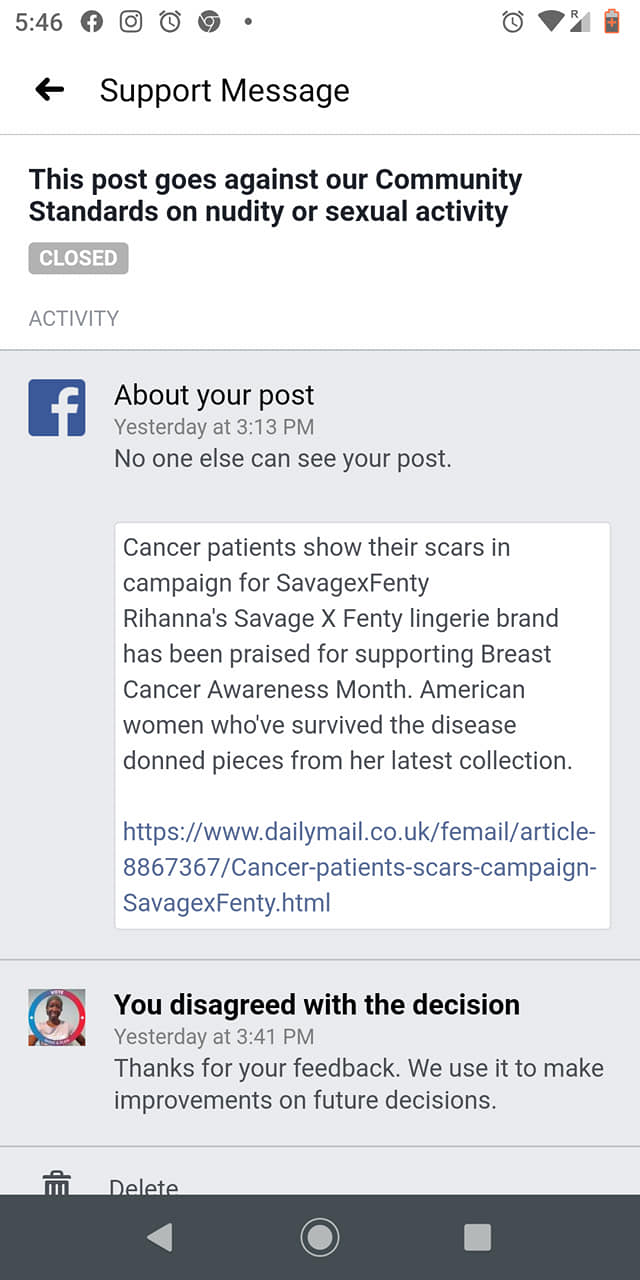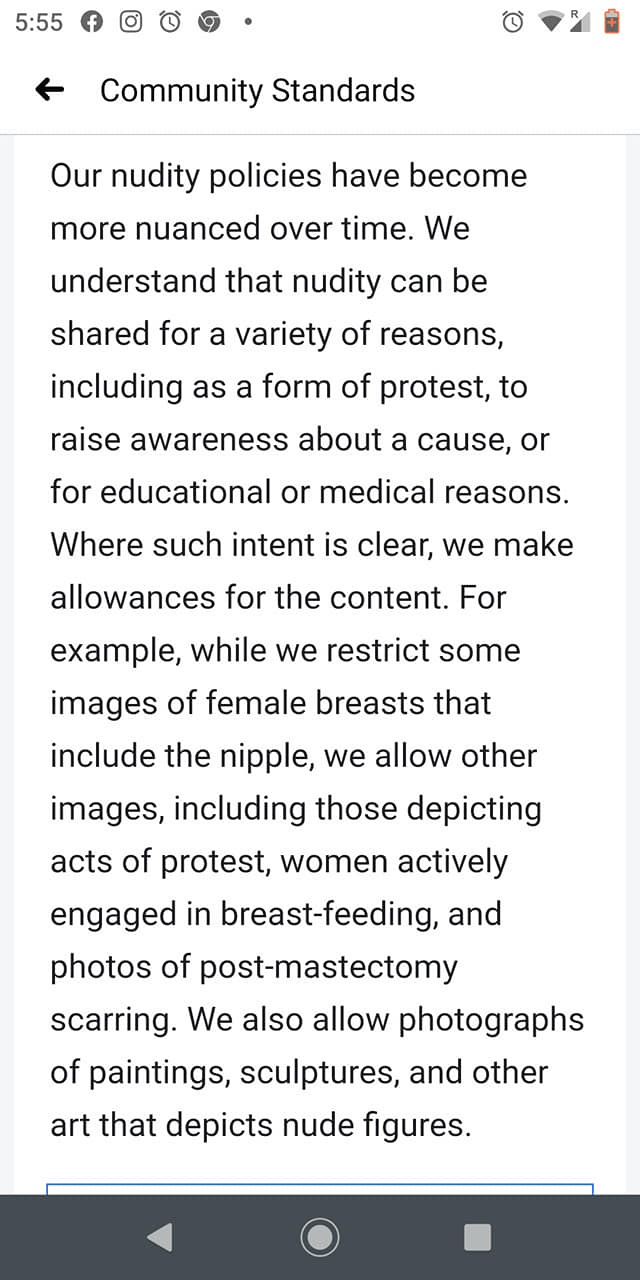Facebook has long been accused of bias in its algorithms and despite claims that they are trying to improve things, it never seems to get better.
The latest case in point is my own experience on Facebook the other day. I saw an article about Rihanna’s Fenty clothing line using breast cancer survivors, some of whom were proudly showing scars left from their cancer, modeled her clothing. I posted this on Facebook, only to have it removed from view, and told I violated the community standards for nudity. Here’s the thing though. It doesn’t. Here’s a screenshot of my post and a screenshot of their community standards (both taken on my phone).
So, for those using a screen reader, the left is a picture of Facebook blocking the article: (headline) Cancer patients show their scars in campaign for SavagexFenty; (subhead) Rihanna’s Savage X Fenty Lingerie brand has been praised for supporting Breast Cancer Awareness Month. American women who survived the disease donned pieces for her latest collection. The Facebook message says “This post goes against our Community Standards on nudity or sexual activity.”
The screenshot on the right is from Facebook’s Community Standards page and says, “For example, while we restrict some images of female breasts that include the nipple, we allow other images, including those depicting acts of protest, women actively engaged in breast-feeding, and photos of post-mastectomy scarring. We also allow photographs of paintings, sculptures, and other art that depicts nude figures.”
So, the pictures of the black women who had scarring was not in fact in violation of their policy. Despite my appeal, Facebook continued to suppress my post and sent me a note saying my account would be suspended if I violated their policy again. Despite the fact that Facebook regularly obscures images, offers a warning that some may view it as inappropriate or triggering, and requires you to click on the image to see it, it didn’t choose to do any of these things. It chose to block the posting of a good news story and threaten me.
This is problematic behavior for multiple reasons. First and foremost, breast cancer is a horrific disease that plagues too many women. Too many women die, leaving behind holes in the hearts of their friends and families. Those who survive, who fight through chemo, radiation, surgery, and other treatments deserve respect and grace. And when Facebook suppresses stories about survivors, it dishonors all breast cancer patients. It makes it seem as if their scars are something they should be ashamed of, rather than the mark of their battle they fought hard and were fortunate enough to win. Suppressing these post—particularly in the heart of Breast Cancer Awareness Month—especially dishonors those fighting the disease and looking for inspiration to help them through treatments that are often grueling and soul crushing.
The second problem with the removal of this post is racial bias. The women pictured in the article were black breast cancer survivors. I am also a black woman and Facebook has a history of silencing posts by black people. USA Today wrote an article about the practice, known as “getting Zucked.” While the article talked primarily about mislabeled hate speech, the same algorithms that discriminate against black people for hate speech can discriminate against Black people in other areas. Additionally, there is evidence that facial recognition software is designed to detect white skin and does poorly with darker skin tones. And while faces are nuanced in many ways the rest of the body isn’t, it’s not clear to me that software designed to recognize body parts wouldn’t have the same problem with identifying properly black mastectomy survivors with scars? Did the algorithm even read the headline or content of the article?
There is also evidence that racism and sexism get programmed into algorithms. And if there was an initial error, then there should be an easy way for a human to correct it. However, my disagreement that it did not violate their standards was reviewed (I do not know if it was by a person or a machine) and then I was told I was wrong. That’s not right.
The problem is, despite many calls from activists within the breast cancer community and the Black community, Facebook can’t get it right. The ACLU continues to fight for those harmed by Facebook’s bias, but it shouldn’t take a fight. They must do better.
The only people who don’t need to do any better are those living with and battling breast cancer. They are doing their all and more, and I salute them. Those who are brave enough to show us your scars, I will always promote you and honor you. You have nothing to be ashamed of. To women who have survived with or without scars, you have nothing to be ashamed of. To anyone who wants to share those stories, you have nothing to be ashamed of. Share loud and proud, with or without pictures.
The only people who should be ashamed work at Facebook.

